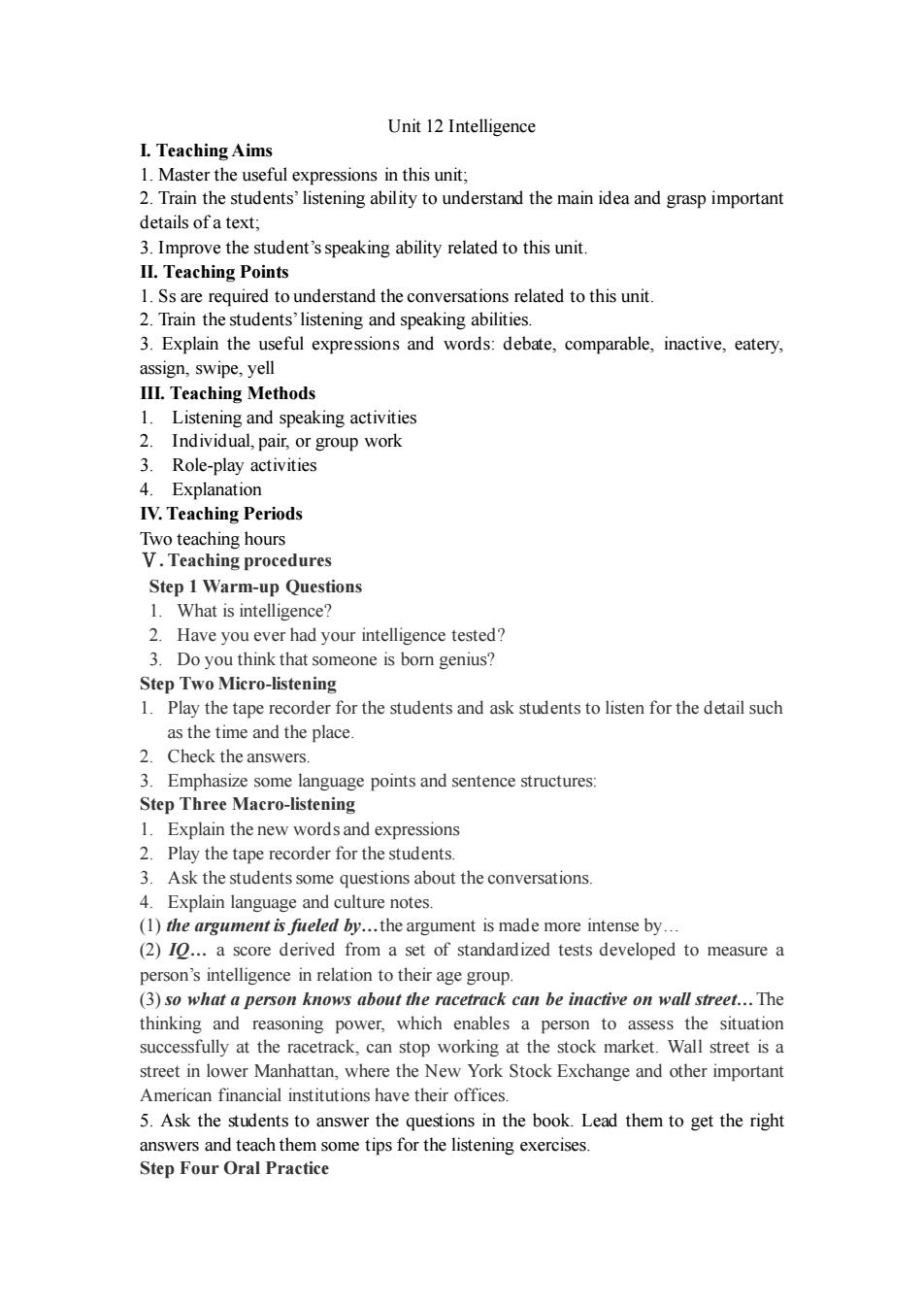正在加载图片...

Unit 12 Intelligence LTeaching Aims 1.Master the useful expressions in this unit. 2.Train the students'listening ability to understand the main idea and grasp important details of a text: 3.Improve the student's speaking ability related to this unit. II.Teaching Points 2. Train the students'listening and speaking abilities. 3.Explain the useful expressions and words:debate,comparable,inactive,eatery. assign.swipe.vell Ⅲ.Teaching Methods 2 Role-play activities 4.Explanation IV.Teaching Periods ng procedures Step 1 Warm-up Questions 1.What is intelligence? 2.Have you ever had your intelligence tested? ing 1.Play the tape recorder for the students and ask students to listen for the detail such as the time and the place 2 Check the answers 3.Emphasize some language points and sentence structures Step Three Macro-list Explain the new words and expressions 2.Play the tape recorder for the students. 3.Ask the students some questions about the conversations. 4.Explain language and culture notes. (1)he nt is fueled bv..the argument is made more intense by (2)1...a score derived from a set of standardized tests developed to measure a person's intelligence in relation to their age group. (3)so what a person knows about the racetrack can be inactive on wall street...The thinking and reasoning power which enables a person to assess the situation successfully at the racetrack,can stop working at the stock market.Wall street is a street in lowe Manha where the New Yo k Stock Exchange and other important American financial institutions have their offices 5.Ask the students to answer the questions in the book.Lead them to get the right answers and teach them some tips for the listening exercises. Step Four Oral practice Unit 12 Intelligence I. Teaching Aims 1. Master the useful expressions in this unit; 2. Train the students’ listening ability to understand the main idea and grasp important details of a text; 3. Improve the student’s speaking ability related to this unit. II. Teaching Points 1. Ss are required to understand the conversations related to this unit. 2. Train the students’ listening and speaking abilities. 3. Explain the useful expressions and words: debate, comparable, inactive, eatery, assign, swipe, yell III. Teaching Methods 1. Listening and speaking activities 2. Individual, pair, or group work 3. Role-play activities 4. Explanation IV. Teaching Periods Two teaching hours Ⅴ. Teaching procedures Step 1 Warm-up Questions 1. What is intelligence? 2. Have you ever had your intelligence tested? 3. Do you think that someone is born genius? Step Two Micro-listening 1. Play the tape recorder for the students and ask students to listen for the detail such as the time and the place. 2. Check the answers. 3. Emphasize some language points and sentence structures: Step Three Macro-listening 1. Explain the new words and expressions 2. Play the tape recorder for the students. 3. Ask the students some questions about the conversations. 4. Explain language and culture notes. (1) the argument is fueled by…the argument is made more intense by… (2) IQ… a score derived from a set of standardized tests developed to measure a person’s intelligence in relation to their age group. (3) so what a person knows about the racetrack can be inactive on wall street…The thinking and reasoning power, which enables a person to assess the situation successfully at the racetrack, can stop working at the stock market. Wall street is a street in lower Manhattan, where the New York Stock Exchange and other important American financial institutions have their offices. 5. Ask the students to answer the questions in the book. Lead them to get the right answers and teach them some tips for the listening exercises. Step Four Oral Practice